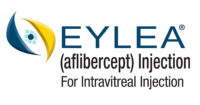What is Macular Degeneration?
Macular degeneration is a progressive condition that affects over 15 million Americans and millions of more people around the world. The disease attacks the macula of the eye and is a disorder of the retina located in the back of the eye. The retina is responsible for transmitting images from the eye to the brain via the optic nerve. Macular degeneration rarely results in complete blindness, but it does damage central vision and may leave only dim images or black holes at the center of vision. This condition affects mostly the aging population. Many affected patients find it harder to see things that are directly in front of them This will result in making reading, writing and driving very difficult. 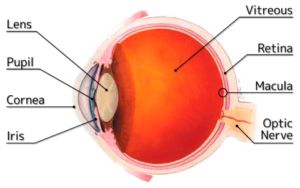
There are a number of abnormalities associated with the term “age-related macular degeneration.” They range from mild changes with no decrease in vision to abnormalities severe enough to result in the loss of all “straight-ahead” vision. Macular degeneration does not cause total blindness because the remaining and undamaged parts of the retina outside the macula continue to provide “side” vision.
There are two main types of macular degeneration, “dry” and “wet”. The dry form is by far the most common type. The wet form is much less common, but it happens more quickly and is more severe.
- Dry ARMD accounts for about 8 out of 10 cases of macular degeneration. It develops slowly and causes central vision to become dimmer or more blurry over time. It usually does not cause severe vision loss unless it turns into a wet form.
- Wet ARMD accounts for only about 2 out of 10 cases of macular degeneration. It can cause serious vision loss within months or even weeks. People who have the wet form have the dry form first.
You may have either type in just one eye, but over time you may get it in the other eye too. If you have the wet form of macular degeneration, you may have one or more of the following treatments:
- Photodynamic therapy
- Injections of medicine into your eye
- Laser surgery
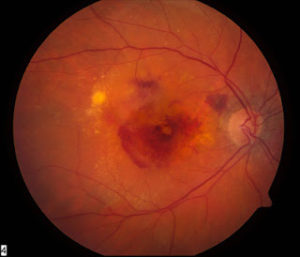 Wet AMD
Wet AMD
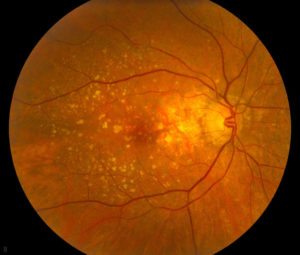 Dry AMD
Dry AMD
These treatments can’t restore central vision, but they may slow down vision loss. If your doctor recommends photodynamic therapy, injections, or laser surgery, it is important to have it done right away.
No one has found a treatment or a cure for the dry form of age-related macular degeneration. Antioxidants may protect against age-related macular degeneration by preventing free radicals or unstable oxygen from damaging the retina. Your ophthalmologist will direct you in the appropriate course of treatment for your specific needs.
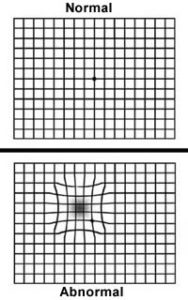
Amsler Grid
The Amsler Grid is used to detect vision problems resulting from damage to the macula caused by problems such as macular degeneration. To test your vision wear your reading glasses (if needed) and view the grid at the same distance from your eyes that you hold a newspaper. Cover one eye and focus on the dot in the center. Ask yourself these questions:
- Do the lines look wavy, distorted, or blurry?
- Are there any missing areas or dark areas?
- Can you see all the sides and corners of the grid?
If it is easier, you may download and print the Amsler Grid. Don’t forget to test both eyes!
Treatment Options For Macular Degeneration
There are certain drug treatment options available to reduce existing abnormal blood vessels including Lucentis® and Avastin.
Lucentis® Treatment works by preventing the growth of abnormal blood vessels while treating the swelling of the macula. Most likely the vision loss caused by wet macular degeneration can’t be fully regained, but Lucentis® works to prevent any further vision loss, while in some cases, reversing some vision lost with macular degeneration.
Administering Lucentis® is an in-office procedure where the pupil must be dilated and the eye is numbed with anesthesia before the Lucentis® is injected into the vitreous (the clear jelly-like fluid that fills the inside of your eye). The injections will need to take place on a regular basis, generally every four weeks, but it is important to speak directly with your Raleigh Ophthalmology retina specialist to determine the exact schedule path for you.
Avastin is also a drug treatment option that works just like Lucentis® to reduce the growth of abnormal blood vessels. Developed by the same company, Avastin is also highly effective and is a cheaper treatment option compared to Lucentis®. It has only been approved by the FDA for the treatment of colon and other cancers, but it is very widely used for the treatment of macular degeneration.


